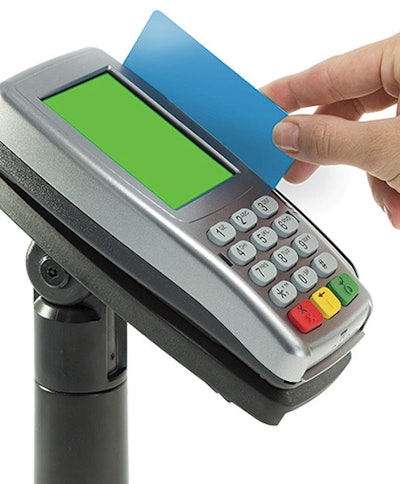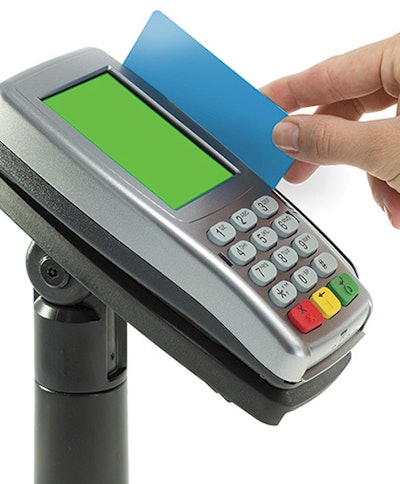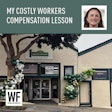
 Shutterstock.com | Konstantin Kolosov
Shutterstock.com | Konstantin Kolosov
Your customers love to pay with credit and debit cards. Unfortunately, merchant account fees can take a hefty slice out of each sales transaction—sometimes to the tune of 3 percent or more. And that, in turn, can make a costly dent in profits.
But the news isn't all bad in the credit card world.
Given the number of merchant account providers clamoring for business, it's not uncommon for a retailer to reduce costs by shopping for a better deal. And landing a more favorable contract can bolster the bottom line: Trimming two percentage points off the cost of a merchant account can mean $2,000 in additional profit for every $100,000 of annual revenue.
That level of savings is not unheard of, due to the industry's wide pricing disparity. Smaller merchants, especially, have long been burdened by contracts with onerous terms: perhaps 3 percent plus a quarter for each transaction, instead of a more reasonable, and commonly available, 1.8 percent to 2.4 percent plus a dime. In such cases there's plenty of latitude to find a better deal.
Start Local
Of course, shopping around must be done the right way. It's tempting to start negotiating with all of the merchant account providers that are battering down your door and advertising on the Internet. Before you go too far afield, though, take a look in your own backyard by making an appointment with your regular financial institution.
You might get the best service from your local bank.
"My advice is to start with your local bank where you already do business," says Mike Shatz, a Boston-based merchant account consultant. If you have a lending agreement with a bank, the bank has your business as an incentive to make sure you have a merchant account agreement with a competitive rate.
Once you have an offer from your bank, you can search for a better deal from merchant account providers, often referred to as Independent Sales Organizations (ISOs). Just be aware that price comparisons can be tougher than you think.
"ISOs can set prices and terms on a per-case basis," says Ben Dwyer, president of CardFellow, an online merchant account marketplace where credit card processors compete for business. As a result, he says, "you can call an ISO and get one quote, then call back a few minutes later and get another quote that is completely different."
Aggregating Accounts
Because performing the work required for underwriting a new merchant account can be expensive and very time consuming, small businesses are sometimes shunned by ISOs. Hence the rise of organizations called "aggregators" to serve the small business market. Aggregators share one merchant account (or a few) with hundreds or thousands of client businesses. The largest of such aggregators are Square.com, PaypalHere.com and Intuit Merchant Services.
Aggregators might be good choices for businesses that transact low volumes of credit card sales and therefore might be spurned by ISOs or charged high markups. Another benefit is the lack of a monthly service charge common with ISO merchant accounts.
Aggregators, however, are often more expensive than competitive merchant accounts. That's because aggregators usually bundle all merchant account fees into one flat charge, often consisting of a percentage and a flat fee assessment. The result is that you might end up paying more for merchant services than you otherwise would. "As a rule of thumb, if you are transacting more than $2,000 a month in credit card sales, you probably do not want to use an aggregator," Dwyer says. Instead, look for an ISO that offers a "cost-plus" pricing model.
Cost-Plus Pricing
For decades, merchant account contracts have called for a simplified rate structure called "tiered pricing." Also called "bundled pricing," this model lumps all of the retailer's sales transactions into a few buckets of general pricing tiers with specified percentage charges.
Retailers are gradually learning that tiered-pricing arrangements are costly because they end up requiring retailers to make payments far higher than what is charged by the banks issuing credit cards. Now becoming more common is a much better rate structure in which the ISO charges a specified percentage and flat fee markup for each of a retailer's transactions. Because the ISO's percentage and fee are added to the bank's fee, which is passed through as a cost, this arrangement is called "cost-plus pricing," or "pass-through pricing."
Quotes for cost-plus pricing vary widely. To some extent they are affected by the size of the retailer. "For example, a processor may quote a business with a low average sale amount a markup of 0.50 percent + $0.04, while it may quote a business with a high sale amount a markup of 0.10 percent + $0.15," Dwyer says.
As attractive as it is, cost-plus pricing adds further complexity when a retailer attempts to compare rival merchant account quotes. You will need to invest some time in studying competing contracts to assess their relative merits. An easier way to make sure competing quotes are working with equivalent terms is to use one of the online merchant account marketplaces.
One Final Point
You might get the best service from your local bank, the institution this article encouraged you to investigate early in your merchant account search. "A bank where you already do business has a vested interest in making sure your processing goes smoothly," Shatz says. While many banks farm out their processing, they will make sure any third-party processor is reputable. That processor, in turn, will want to make sure it keeps its client bank happy. It all comes together to encourage good service for you.
While shopping for a better deal is a good idea if managed carefully, there is a point of diminishing returns, according to Shatz. "From a general business sense, if I were a retailer with revenues under $2.5 million and if I had a cost-plus agreement with a processor so that my merchant fees were between 2.1 percent and 2.4 percent of sales, I would focus my energies on building up my company rather than waste time trying to find a less expensive processor."

































